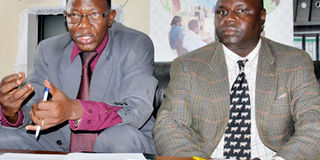Mak loses billions in patent rights

The director of research and graduate training at Makerere University, Prof Mukadasi Buyinza (L), with former deputy director (Research) George William Nasinyama (R) at a press conference last Friday. PHOTO BY DOMINIC BUKENYA
What you need to know:
Technology. Makerere researchers call for faster protection of their innovations before they get to the public.
Kampala. Makerere University has warned that the country is losing a lot of money through researchers who expose their innovations to the public before they are protected.
Citing the nevirapine drug used in preventing mother-to-child transmission of HIV and the Makpads innovations, Mr George William Nasinyama, former deputy director in charge of research at Makerere University School of Graduate Studies, told journalists last Friday that government should emulate other countries from the East which are fast at protecting innovations.
“We had a challenge with the drug, nevirapine. The innovation was done here at Makerere University but it was a collab oration of different partners, including people from United Kingdom,” Mr Nasinyama said.
“But at that time, we were not very conscious about intellectual property. The UK partners moved very fast and protected the technology. We almost lost out. By the time we woke up, the technology was already protected. Noise was made internationally and the UK body had to reconsider that protection,” he added.
Nevirapine drug was innovated through a joint effort between researchers at Makerere University and Johns Hopkins University School of Medicine.
Mr Nasinyama warned that: “One of the areas we have to protect very quickly is the far East region of this world. For them, once they land on something, they quickly move before you know it, they have protected it. We had the Makpad issue which by the time we came to learn of, it was already public knowledge.”
Prof Mukadasi Buyinza, the graduate school director, said the institution will focus on translating their research findings into tangible solutions in the next five years to benefit both the communities and researchers commercially.
“Generation of knowledge is important but the ultimate aim is the uptake. Is it being utilised by the community? In that way, you will be motivating the researchers. In the next five years, we are giving a little bit of focus to commercialisation,” Prof Buyinza said.
Patent costs
Once protected, a patent for any idea lasts for up to 20 years. But Mr Nasinyama said the cost is very expensive for an individual, calling on researchers to utilise their institution.
For instance, he said the protection in the African region costs $3,000 (Shs9 million) annually, in Europe about $20,000 (Shs60million) per year while it goes for $11,000 (Shs33 million) for any patent in the far East.[email protected]


